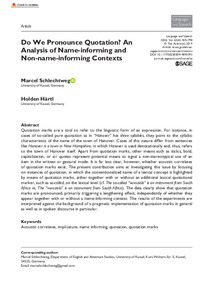Datum
2019-12-23Metadata
Zur Langanzeige
Aufsatz

Do We Pronounce Quotation? An Analysis of Name-informing and Non-name-informing Contexts
Zusammenfassung
Quotation marks are a tool to refer to the linguistic form of an expression. For instance, in cases of so-called pure quotation as in “Hanover” has three syllables, they point to the syllabic characteristics of the name of the town of Hanover. Cases of this nature differ from sentences like Hanover is a town in New Hampshire, in which Hanover is used denotationally and, thus, refers to the town of Hanover itself. Apart from quotation marks, other means such as italics, bold, capitalization, or air quotes represent potential means to signal a non-stereotypical use of an item in the written or gestural mode. It is far less clear, however, whether acoustic correlates of quotation marks exist. The present contribution aims at investigating this issue by focusing on instances of quotation, in which the conventionalized name of a lexical concept is highlighted by means of quotation marks, either together with or without an additional lexical quotational marker, such as so-called, on the lexical level (cf. The so-called “vuvuzela” is an instrument from South Africa vs. The “vuvuzela” is an instrument from South Africa). The data clearly show that quotation marks are pronounced, primarily triggering a lengthening effect, independently of whether they appear together with or without a name-informing context. The results of the experiments are interpreted against the background of a pragmatic implementation of quotation marks in general as well as in spoken discourse in particular.
Zitierform
In: Language and Speech Volume 63 / Issue 4 (2019-12-23) , S. 769-798 ; eissn:1756-6053Zusätzliche Informationen
Dieser Beitrag ist mit Zustimmung des Rechteinhabers aufgrund einer (DFGgeförderten) Allianz- bzw. Nationallizenz frei zugänglich. This publication is with permission of the rights owner freely accessible due to an Alliance licence and a national licence (funded by the DFG, German Research Foundation) respectively.Zitieren
@article{doi:10.17170/kobra-202105123882,
author={Schlechtweg, Marcel and Härtl, Holden},
title={Do We Pronounce Quotation? An Analysis of Name-informing and Non-name-informing Contexts},
journal={Language and Speech},
year={2019}
}
0500 Oax
0501 Text $btxt$2rdacontent
0502 Computermedien $bc$2rdacarrier
1100 2019$n2019
1500 1/eng
2050 ##0##http://hdl.handle.net/123456789/12986
3000 Schlechtweg, Marcel
3010 Härtl, Holden
4000 Do We Pronounce Quotation? An Analysis of Name-informing and Non-name-informing Contexts / Schlechtweg, Marcel
4030
4060 Online-Ressource
4085 ##0##=u http://nbn-resolving.de/http://hdl.handle.net/123456789/12986=x R
4204 \$dAufsatz
4170
5550 {{Gesprochene Sprache}}
5550 {{Phonetik}}
5550 {{Aussprache}}
5550 {{Anführungszeichen}}
5550 {{Zitat}}
7136 ##0##http://hdl.handle.net/123456789/12986
<resource xsi:schemaLocation="http://datacite.org/schema/kernel-2.2 http://schema.datacite.org/meta/kernel-2.2/metadata.xsd"> 2021-07-07T11:32:51Z 2021-07-07T11:32:51Z 2019-12-23 doi:10.17170/kobra-202105123882 http://hdl.handle.net/123456789/12986 Dieser Beitrag ist mit Zustimmung des Rechteinhabers aufgrund einer (DFGgeförderten) Allianz- bzw. Nationallizenz frei zugänglich. This publication is with permission of the rights owner freely accessible due to an Alliance licence and a national licence (funded by the DFG, German Research Foundation) respectively. eng acoustic correlates implicature name informing quotation quotation marks 420 Do We Pronounce Quotation? An Analysis of Name-informing and Non-name-informing Contexts Aufsatz Quotation marks are a tool to refer to the linguistic form of an expression. For instance, in cases of so-called pure quotation as in “Hanover” has three syllables, they point to the syllabic characteristics of the name of the town of Hanover. Cases of this nature differ from sentences like Hanover is a town in New Hampshire, in which Hanover is used denotationally and, thus, refers to the town of Hanover itself. Apart from quotation marks, other means such as italics, bold, capitalization, or air quotes represent potential means to signal a non-stereotypical use of an item in the written or gestural mode. It is far less clear, however, whether acoustic correlates of quotation marks exist. The present contribution aims at investigating this issue by focusing on instances of quotation, in which the conventionalized name of a lexical concept is highlighted by means of quotation marks, either together with or without an additional lexical quotational marker, such as so-called, on the lexical level (cf. The so-called “vuvuzela” is an instrument from South Africa vs. The “vuvuzela” is an instrument from South Africa). The data clearly show that quotation marks are pronounced, primarily triggering a lengthening effect, independently of whether they appear together with or without a name-informing context. The results of the experiments are interpreted against the background of a pragmatic implementation of quotation marks in general as well as in spoken discourse in particular. open access Schlechtweg, Marcel Härtl, Holden doi:10.1177/0023830919893393 Gesprochene Sprache Phonetik Aussprache Anführungszeichen Zitat publishedVersion eissn:1756-6053 issn:0023-8309 Issue 4 Language and Speech 769-798 Volume 63 false </resource>
Die folgenden Lizenzbestimmungen sind mit dieser Ressource verbunden:

